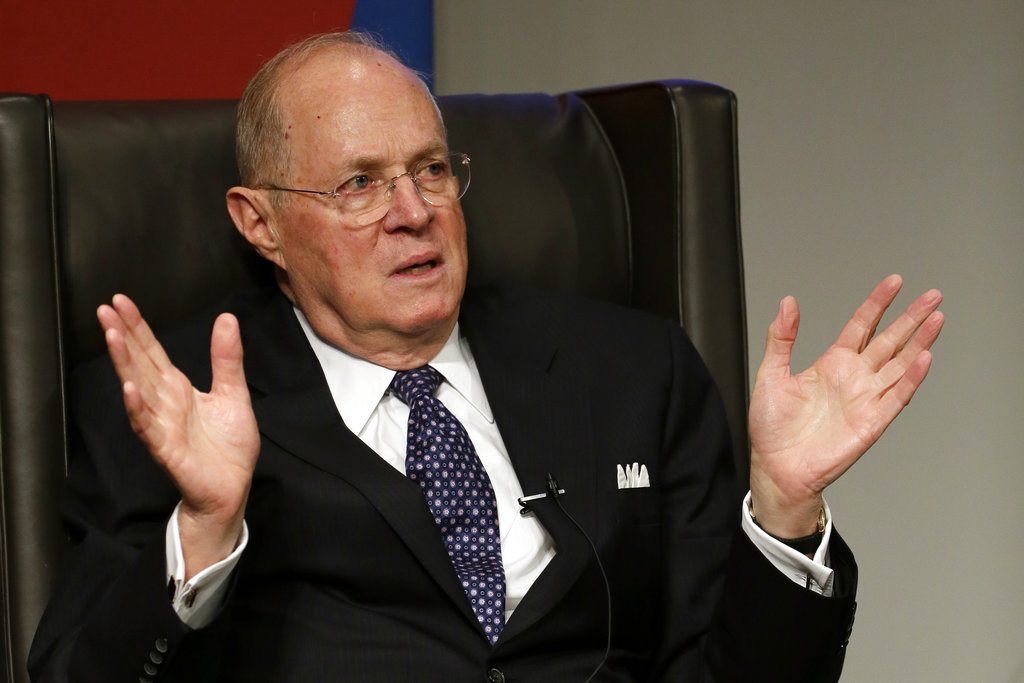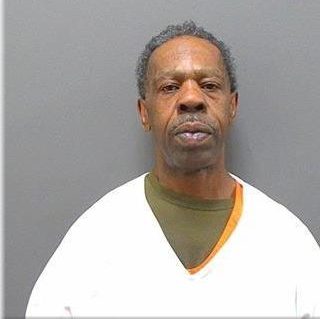Justice Kennedy retiring; Trump gets 2nd US Supreme Court pick
By: Associated Press//June 27, 2018//
Justice Kennedy retiring; Trump gets 2nd US Supreme Court pick
By: Associated Press//June 27, 2018//

By MARK SHERMAN
Associated Press
WASHINGTON (AP) — U.S. Supreme Court Justice Anthony Kennedy announced his retirement Wednesday, giving President Donald Trump a golden chance to cement conservative control of the high court.
The 81-year-old Kennedy said in a statement he is stepping down after more than 30 years on the court. A Republican appointee, he has held the key vote on such high-profile issues as abortion, affirmative action, gay rights, guns, campaign finance and voting rights.
Kennedy said he had informed his colleagues and Trump of his plans, and that his retirement will take effect at the end of July.
Trump praised Kennedy as a man of “tremendous vision” and said his search for a new justice would begin “immediately.”
WASHINGTON (AP) — President Donald Trump’s list of candidates for the U.S. Supreme Court, posted on White House website last November:
—Amy Coney Barrett of Indiana, U.S. Court of Appeals for the 7th Circuit
—Keith Blackwell of Georgia, Supreme Court of Georgia
—Charles Canady of Florida, Supreme Court of Florida
—Steven Colloton of Iowa, U.S. Court of Appeals for the 8th Circuit
—Allison Eid of Colorado, U.S. Court of Appeals for the 10th Circuit
—Britt Grant of Georgia, Supreme Court of Georgia
—Raymond Gruender of Missouri, U.S. Court of Appeals for the 8th Circuit
—Thomas Hardiman of Pennsylvania, U.S. Court of Appeals for the 3rd Circuit
—Brett Kavanaugh of Maryland, U.S. Court of Appeals for the District of Columbia Circuit
—Raymond Kethledge of Michigan, U.S. Court of Appeals for the 6th Circuit
—Joan Larsen of Michigan, U.S. Court of Appeals for the 6th Circuit
—Mike Lee of Utah, United States Senator
—Thomas Lee of Utah, Supreme Court of Utah
—Edward Mansfield of Iowa, Supreme Court of Iowa
—Federico Moreno of Florida, U.S. District Court for the Southern District of Florida
—Kevin Newsom of Alabama, U.S. Court of Appeals for the 11th Circuit
—William Pryor of Alabama, U.S. Court of Appeals for the 11th Circuit
—Margaret Ryan of Virginia, U.S. Court of Appeals for the Armed Forces
—David Stras of Minnesota, U.S. Court of Appeals for the 8th Circuit
—Diane Sykes of Wisconsin, U.S. Court of Appeals for the 7th Circuit
—Amul Thapar of Kentucky, U.S. Court of Appeals for the 6th Circuit
—Timothy Tymkovich of Colorado, U.S. Court of Appeals for the 10th Circuit
—Robert Young of Michigan, Supreme Court of Michigan (Ret.)
—Don Willett of Texas, Supreme Court of Texas
—Patrick Wyrick of Oklahoma, Supreme Court of Oklahoma
Without Kennedy, the court will be split between four liberal justices who were appointed by Democratic presidents and four conservatives who were named by Republicans. Trump’s nominee is likely to give the conservatives a solid majority and will face a Senate process in which Republicans hold the slimmest majority, but Democrats can’t delay confirmation.
Trump’s first high court nominee, Neil Gorsuch, was confirmed in April 2017. If past practice is any indication, Trump will name a nominee within weeks, setting in motion a process that could allow confirmation by the time the court reconvenes in early October.
Trump already has a list of 25 candidates — 24 judges and Utah Sen. Mike Lee — and has said he would choose a nominee from that list.
Abortion is likely to be one of the flash points in the nomination fight. Kennedy has mainly supported abortion rights in his time on the court, and Trump has made clear he would try to choose justices who want to overturn the landmark abortion rights case of Roe v. Wade. Such a dramatic step may not be immediately likely, but a more conservative court might be more willing to sustain abortion restrictions.
Interest groups across the political spectrum are expected to mobilize to support and fight the nomination because it is so likely to push the court to the right.
Republicans currently hold a bare 51-49 majority in the Senate, although that includes the ailing Sen. John McCain of Arizona. If Democrats stand united in opposition to Trump’s choice, Senate Majority Leader Mitch McConnell of Kentucky can lose no more than one vote. If the Senate divides 50-50, Vice President Mike Pence could break a tie to confirm the nominee.
Prominent on the list of possible successors are Judges Thomas Hardiman of Pennsylvania and William Pryor of Alabama, who was seriously considered for the seat eventually filled by Gorsuch, and Judge Brett Kavanaugh, who serves on the federal appeals court in Washington.
Kavanaugh is a longtime Washington insider, having served as a law clerk to Kennedy and then as a key member of independent counsel Kenneth Starr’s team that produced the report that served as the basis for President Bill Clinton’s impeachment. In October, Kavanaugh dissented when his court ruled that a teenage migrant in federal custody should be able to obtain an abortion immediately.
Regardless of who replaces him, Kennedy’s departure will be a massive change for the high court, where he has been the crucial swing vote for more than a decade. He has sided with the liberal justices on gay rights and abortion rights, as well as some cases involving race, the death penalty and the rights of people detained without charges at the Guantanamo Bay naval base. He has written all the court’s major gay-rights decisions, including the 2015 ruling that declared same-sex marriage is a constitutional right nationwide.
However, he also has been a key vote when conservatives have won major rulings on the outcome of the 2000 presidential election in favor of George W. Bush, gun rights, limiting regulation of campaign money and gutting a key provision of the landmark federal Voting Rights Act.
There were no outward signs that Kennedy was getting ready to retire. He had hired his allotment of four law clerks for the term that begins in October and he is planning to spend part of the summer as he typically does, teaching a law school class in Salzburg, Austria.
But several former law clerks have said that Kennedy, a nominee of President Ronald Reagan, preferred to be replaced by a Republican. Control of the Senate is at stake in the November elections, and if Democrats capture the majority, Trump could find it difficult to get his choice confirmed.
Few obstacles seem to stand in the way of confirming Kennedy’s replacement before the court reconvenes in October. Republicans changed the rules during Gorsuch’s confirmation to wipe out the main delaying tactic for Supreme Court nominees, the filibuster, and the need for 60 votes to defeat it.
The other two older justices, Ruth Bader Ginsburg, 85, and Stephen Breyer, 79, are Democratic appointees who would not appear to be going anywhere during a Trump administration if they can help it.
Legal News
- FBI launches criminal investigation into Key Bridge collapse
- Man charged in slaying after woman’s leg found at Milwaukee-area park
- Minnesota man guilty in fatal stabbing of teen on Wisconsin river, jury finds
- Wisconsin teen sentenced in bonfire explosion that burned at least 17
- Wisconsin man who broke into home, ate victim’s chicken, slept in victim’s bed, receives prison and jail sentences
- Judge refuses to dismiss Hunter Biden’s gun case
- House passes reauthorization of key US surveillance program after days of upheaval over changes
- Milwaukee Police officer traveling to Georgia training retires before facing discipline
- Evers to ask legislature to approve largest increase in state support for UW System in two decades
- 7th Circuit Court of Appeals proposes new rules
- Federal agencies allege toxic work environment for women in new report
- Wisconsin man sentenced for sex trafficking a woman and a minor online
WLJ People
- Power 30 Personal Injury Attorneys – Russell Nicolet
- Power 30 Personal Injury Attorneys – Benjamin Nicolet
- Power 30 Personal Injury Attorneys – Dustin T. Woehl
- Power 30 Personal Injury Attorneys – Katherine Metzger
- Power 30 Personal Injury Attorneys – Joseph Ryan
- Power 30 Personal Injury Attorneys – James M. Ryan
- Power 30 Personal Injury Attorneys – Dana Wachs
- Power 30 Personal Injury Attorneys – Mark L. Thomsen
- Power 30 Personal Injury Attorneys – Matthew Lein
- Power 30 Personal Injury Attorneys – Jeffrey A. Pitman
- Power 30 Personal Injury Attorneys – William Pemberton
- Power 30 Personal Injury Attorneys – Howard S. Sicula











